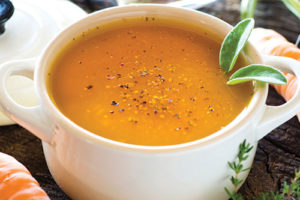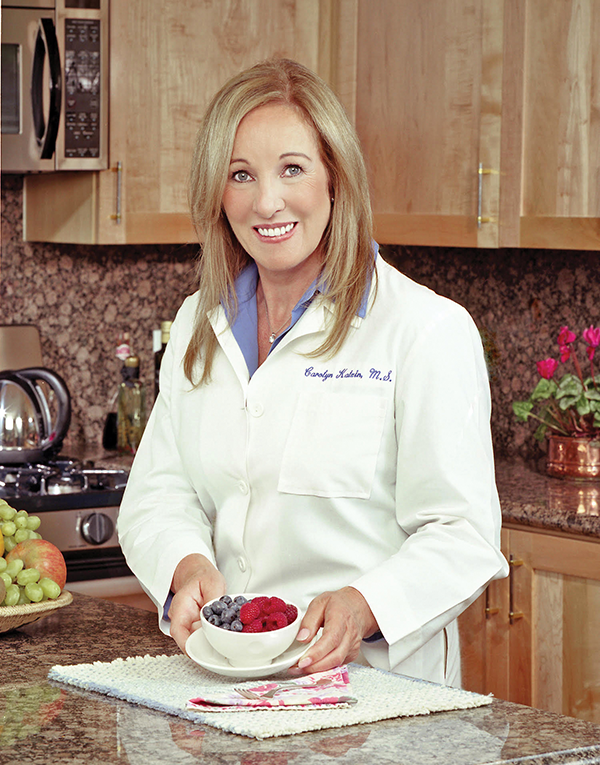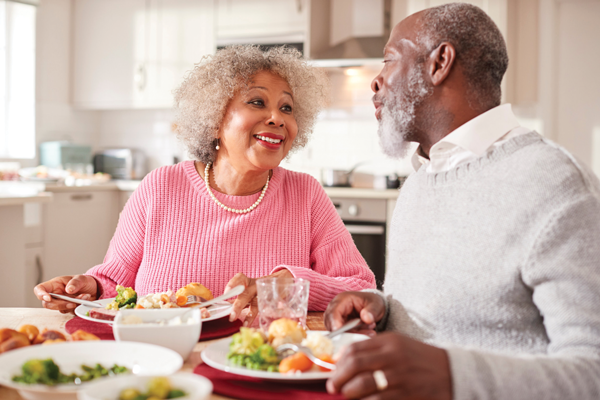What Should I Eat Now?
Getting the Nutrition You Need During Cancer Treatment
by Carolyn Katzin, MS, CNS, MNT
After a diagnosis of cancer, many people feel a loss of confidence when it comes to nutrition. Some cancer survivors question their earlier food choices, while others begin to strictly limit foods they consider “bad,” like sugar and caffeine.
As food is one of the few areas over which cancer survivors have some control, it is important to recognize which diet modifications may be helpful, and which may simply reflect a bargaining aspect of adjusting to a cancer diagnosis. (For example: If I am strict with my diet, perhaps this will just all go away.)
While this thought process is understandable, it’s a good idea to look at what the science tells us. Let’s see if there may be some sensible and empowering diet changes you can make without taking away the enjoyment of eating.
Eating for Cancer Prevention vs. Eating Well During Cancer Treatment
It’s easy to be confused about the difference between eating for cancer prevention and eating a diet that is suitable for someone undergoing cancer treatment. Let’s clarify.
Eating for cancer prevention focuses on reducing your exposure to potential carcinogens. When eaten regularly over an extended period, dietary carcinogens include meats cooked at high temperatures and those preserved using nitrates. During treatment, however, some of these foods may stimulate appetite and thus be beneficial.
During cancer treatment, you should choose foods that taste good, don’t cause heartburn, and help you have regular bowel movements. Typical cancer treatment involves surgery, radiation, chemotherapy, and targeted therapies like immunotherapy. Let’s look at each in turn and see what diet modifications are most beneficial for each type of cancer treatment.
Surgery: After surgery for cancer, you need to eat more protein to aid in your recovery. For most people, this means adding another 20 grams a day, or the equivalent of about 3 ounces of fish, chicken, lean meat, or shellfish. Or about 8 ounces of beans, tofu, or quinoa.
Radiation: During radiation, avoid high-dose single antioxidants, such as Vitamin C, beta carotene, and Vitamin E, as these may blunt the effectiveness of your treatment.
Chemotherapy: Hydration is especially important during chemo. Protein needs are also increased. A ready-to-drink amino acid or peptide supplement can help you get both.
Molecularly Targeted Therapy and Immunotherapies: Grapefruit, noni, mangosteen, and certain other fruits may affect how your body metabolizes certain medications and may need to be avoided. Check with your doctor or pharmacist to be sure.
Treatment Side Effects & Nutrition
Now, let’s look at some of the common side effects of cancer treatment and how modifying your diet may help you to manage them.
Fatigue is a common side effect of all cancer treatments. Dehydration can worsen fatigue, so it’s important to make sure you drink enough fluids each day. Start with drinking extra fluids first thing in the morning. Then, sip water and other unsweetened beverages throughout the day. After about 6:00 p.m., you should aim to “eat your water” by consuming foods with high water content. Eating soups and broths is an effective way to add electrolyte-rich, tasty fluids to your diet (see sidebar for recipe). Coconut water and other electrolyte-rich fluids are also good choices. Additionally, some people find drinking green tea or eating dark chocolate helps with fatigue.
During cancer treatment, you should choose foods that taste good, don’t cause heartburn, and help you have regular bowel movements.
Appetite and taste changes, as well as feelings of early satiety or fullness, may affect your ability to eat. If your food has a bitter, metallic taste, try eating with non-metal utensils like bamboo or plastic. Additionally, altering your diet can help you cope with treatment-related taste changes. For example, umami, or savoriness, is one of the basic tastes that is often less affected by taste changes than, say, sweet or sour tastes. Umami is a glutamate-like flavor, similar to MSG, found in many Asian dishes. You might also try experimenting with different textures to help make food more appealing. For nausea, ask your doctor about medications to help prevent this common treatment-related side effect. Ginger is also a safe and effective remedy for nausea. Try drinking ginger ale or ginger tea, sucking on ginger hard candies, or eating ginger cookies or cake.
Changes in bowel habits, such as constipation and diarrhea, are common during cancer treatment. To help ease constipation, try eating gentle, natural laxative fruits like plums or prunes, apricots, and cherries, or drinking purified aloe vera juice. Binding foods, like bananas, rice, applesauce, and toast (aka the BRAT diet), should be avoided if you are experiencing constipation. However, these foods are helpful in reducing diarrhea symptoms. Other binding foods include fortified breakfast cereals and thinly sliced, baked bread like pita chips and melba toast. Conversely, simple sugars (like the lactose in milk) may worsen diarrhea and result in gas and discomfort if eaten in large amounts during treatment. Try yogurt or fermented foods instead. Finally, eating frequent snacks or small meals rather than one or two large meals a day can help support gut health and alleviate digestive issues.
Eat Well. Be Well.
Good nutrition is important for good health. As you can see, good nutrition during cancer treatment not only can help with your recovery but can also help you cope with treatment side effects. If you have any questions or concerns about nutrition, you should talk with your doctor, nurse, or a registered dietitian. A dietitian can help you get the nutrition support you need during and after cancer treatment.
Root Vegetable Soup

- 4 carrots (peeled and diced)
- 1 tbsp parsley (fresh)
- 1 turnip (peeled and diced)
- 1 tsp olive oil
- 1 rutabaga (peeled and diced)
- 3 cups water
- 1 parsnip (peeled and diced)
- 1 onion (chopped)
- 1/4 tsp sea salt
- 1/4 tsp black pepper
- 2 cloves garlic (crushed)
Heat a large nonstick skillet and sauté the onion and garlic in olive oil.
Add the turnip and parsnip and continue to sauté for 5 minutes.
Add the carrot and sauté for 3 minutes.
Add the water and bring to a boil.
Cover and simmer for 30 minutes or until cooked.
Adjust the seasonings and serve hot, garnished with fresh parsley.
½ cup of nonfat sour cream may be added to the cooked soup to increase the calcium content of the soup.
Excellent source of Vitamin C, A, and folate. Good source of Vitamin B6 and B1.
Recipe excerpted from The Cancer Nutrition Center Handbook, by Carolyn Katzin

Carolyn Katzin is an Integrative Oncology Specialist at the Simms/Mann – UCLA Center for Integrative Oncology in Los Angeles, CA.
This article was published in Coping® with Cancer magazine, September/October 2021.


